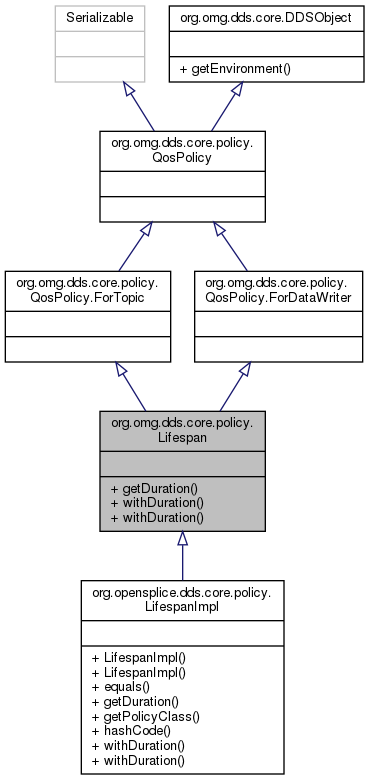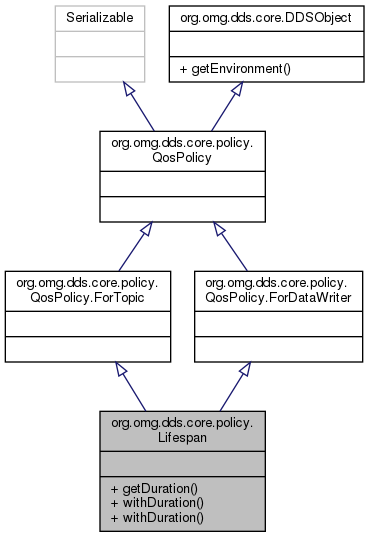 |
OpenSplice Java 5 DCPS
v6.x
OpenSplice Java 5 OpenSplice Data Distribution Service Data-Centric Publish-Subscribe API
|
 |
OpenSplice Java 5 DCPS
v6.x
OpenSplice Java 5 OpenSplice Data Distribution Service Data-Centric Publish-Subscribe API
|
Specifies the maximum duration of validity of the data written by the org.omg.dds.pub.DataWriter. More...


Public Member Functions | |
| Duration | getDuration () |
| ServiceEnvironment | getEnvironment () |
| Lifespan | withDuration (Duration duration) |
| Copy this policy and override the value of the property. More... | |
| Lifespan | withDuration (long duration, TimeUnit unit) |
| Copy this policy and override the value of the property. More... | |
Specifies the maximum duration of validity of the data written by the org.omg.dds.pub.DataWriter.
The default value of the lifespan duration is infinite.
Concerns: org.omg.dds.topic.Topic, org.omg.dds.pub.DataWriter
RxO: N/A
Changeable: Yes
The purpose of this QoS is to avoid delivering "stale" data to the application.
Each data sample written by the DataWriter has an associated "expiration time" beyond which the data should not be delivered to any application. Once the sample expires, the data will be removed from the DataReader caches as well as from the transient and persistent information caches.
The "expiration time" of each sample is computed by adding the duration specified by the LIFESPAN QoS to the source time stamp. As described in org.omg.dds.pub.DataWriter#write(Object) and org.omg.dds.pub.DataWriter#write(Object, org.omg.dds.core.Time), the source time stamp is either automatically computed by the Service each time the write operation is called, or else supplied by the application.
This QoS relies on the sender and receiving applications having their clocks sufficiently synchronized. If this is not the case and the Service can detect it, the DataReader is allowed to use the reception time stamp instead of the source time stamp in its computation of the "expiration time."
Definition at line 57 of file Lifespan.java.
| Duration org.omg.dds.core.policy.Lifespan.getDuration | ( | ) |
Implemented in org.opensplice.dds.core.policy.LifespanImpl.
|
inherited |
Implemented in org.omg.dds.core.ServiceEnvironment, org.opensplice.dds.sub.ReflectionDataReader< TYPE, OUT_TYPE >, org.opensplice.dds.core.ModifiableTimeImpl, org.opensplice.dds.pub.ReflectionDataWriter< TYPE >, org.opensplice.dds.core.DurationImpl, org.opensplice.dds.topic.ContentFilteredTopicImpl< TYPE >, org.opensplice.dds.sub.ReadConditionImpl< TYPE >, org.opensplice.dds.core.EntityQosImpl< T extends QosPolicy >, org.opensplice.dds.type.TypeSupportImpl< TYPE >, org.opensplice.dds.topic.PublicationBuiltinTopicDataImpl, org.opensplice.dds.topic.SubscriptionBuiltinTopicDataImpl, org.opensplice.dds.topic.TopicBuiltinTopicDataImpl, org.opensplice.dds.domain.DomainParticipantFactoryImpl, org.opensplice.dds.core.QosProviderImpl, org.opensplice.dds.core.status.OfferedIncompatibleQosStatusImpl, org.opensplice.dds.core.status.RequestedIncompatibleQosStatusImpl, org.opensplice.dds.core.InstanceHandleImpl, org.opensplice.dds.core.StatusConditionImpl< T extends Entity<?, ?>, org.opensplice.dds.core.status.LivelinessChangedStatusImpl, org.opensplice.dds.core.status.PublicationMatchedStatusImpl, org.opensplice.dds.core.status.SubscriptionMatchedStatusImpl, org.opensplice.dds.sub.SampleImpl< TYPE >, org.opensplice.dds.core.policy.ShareImpl, org.opensplice.dds.core.status.OfferedDeadlineMissedStatusImpl, org.opensplice.dds.core.status.SampleRejectedStatusImpl, org.opensplice.dds.core.WaitSetImpl, org.opensplice.dds.topic.ParticipantBuiltinTopicDataImpl, org.opensplice.dds.core.status.RequestedDeadlineMissedStatusImpl, org.opensplice.dds.topic.BuiltinTopicKeyImpl, org.opensplice.dds.core.GuardConditionImpl, org.opensplice.dds.core.event.AllDataDisposedEventImpl< TYPE >, org.opensplice.dds.core.policy.QosPolicyCountImpl, org.opensplice.dds.core.status.InconsistentTopicStatusImpl, org.opensplice.dds.core.status.LivelinessLostStatusImpl, org.opensplice.dds.core.status.SampleLostStatusImpl, org.opensplice.dds.core.policy.QosPolicyImpl, org.opensplice.dds.core.status.AllDataDisposedStatusImpl, org.opensplice.dds.core.IllegalArgumentExceptionImpl, org.opensplice.dds.core.InconsistentPolicyExceptionImpl, org.opensplice.dds.core.policy.PolicyFactoryImpl, org.opensplice.dds.core.policy.TypeConsistencyEnforcementImpl, org.opensplice.dds.core.PreconditionNotMetExceptionImpl, org.opensplice.dds.core.AlreadyClosedExceptionImpl, org.opensplice.dds.core.IllegalOperationExceptionImpl, org.opensplice.dds.core.ImmutablePolicyExceptionImpl, org.opensplice.dds.core.NotEnabledExceptionImpl, org.opensplice.dds.core.OutOfResourcesExceptionImpl, org.opensplice.dds.core.DDSExceptionImpl, org.opensplice.dds.core.status.DataAvailableStatusImpl, and org.opensplice.dds.core.status.DataOnReadersStatusImpl.
Copy this policy and override the value of the property.
| duration | Specifies a duration for the length in time of the validity of the data. |
Implemented in org.opensplice.dds.core.policy.LifespanImpl.
| Lifespan org.omg.dds.core.policy.Lifespan.withDuration | ( | long | duration, |
| TimeUnit | unit | ||
| ) |
Copy this policy and override the value of the property.
| duration | Specifies a long duration for the length in time of the validity of the data. |
| unit | The TimeUnit which the duration describes (i.e. TimeUnit.SECONDS or TimeUnit.MILLISECONDS) |
Implemented in org.opensplice.dds.core.policy.LifespanImpl.